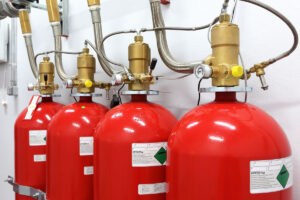
Clean agent fire suppression systems are highly effective systems that are critical for industries that work with sensitive materials or equipment.
Fire suppression systems have come a long way from traditional water-based sprinklers, even though sprinklers are still the most common form of fire protection. While effective in many scenarios, water-based systems can cause extensive damage to sensitive equipment and facilities housing valuable assets like data centers, museums, and laboratories. In such environments, clean agent fire suppression systems have emerged as a preferred solution, offering rapid and effective suppression without leaving behind harmful residue or causing collateral damage.
Understanding Clean Agent Fire Suppression Systems
Clean agent fire suppression systems are designed to extinguish fires by rapidly discharging a gas-based agent that removes heat and interrupts the chemical reaction necessary for combustion. Unlike water or foam-based systems, clean agents leave no residue, making them ideal for protecting delicate electronics, archives, and other sensitive materials.
Types of Clean Agents
Several types of clean agents are utilized in fire suppression systems, each tailored to specific applications and environments:
- HFCs (Hydrofluorocarbons): These agents, such as FM-200 and HFC-227ea, are non-ozone depleting and have become popular replacements for Halon compounds. They work by absorbing heat and chemically interfering with the combustion process.
- Inert Gases: Inert gases like nitrogen, argon, and carbon dioxide are used to displace oxygen from the fire area, reducing the oxygen concentration below the level required to sustain combustion. These agents are particularly suitable for occupied spaces where human safety is a concern.
- Chemical Compounds: Compounds like FE-13 (Trifluoromethane) and FE-25 (Pentafluoroethane) are clean agents that interrupt the chemical chain reaction of fire without depleting the ozone layer. They are effective in suppressing fires in enclosed spaces and are non-conductive, making them suitable for electrical fires.
Industries Benefiting from Clean Agent Systems
Clean agent fire suppression systems find applications across a wide range of industries and facilities where traditional water-based or chemical-based systems are impractical or pose a risk to critical assets. Some of the industries that benefit the most from these systems include:
- Data Centers and IT Facilities: Data centers house servers, networking equipment, and sensitive electronics essential for businesses and organizations. Water-based fire suppression systems can cause irreparable damage to these systems, resulting in costly downtime and data loss. Clean agent systems provide rapid fire suppression without damaging delicate equipment, ensuring minimal disruption to operations.
- Telecommunications: Telecommunication facilities, including cell towers, switching stations, and communication hubs, rely on uninterrupted connectivity to support essential services. Clean agent fire suppression systems are essential for protecting equipment and infrastructure from fire-related downtime, ensuring continuous communication services.
- Museums and Cultural Heritage Sites: Museums and cultural heritage sites house priceless artifacts, artwork, and historical documents that are irreplaceable. Traditional fire suppression methods like water or foam can cause irreversible damage to these items. Clean agent systems offer a non-destructive solution for protecting these treasures from fire damage while preserving their integrity.
- Laboratories and Research Facilities: Laboratories and research facilities often contain hazardous materials, chemicals, and sensitive experiments. Fire suppression systems must extinguish fires quickly without contaminating the environment or damaging equipment. Clean agent systems provide precise and effective fire protection in these environments, safeguarding valuable research and preventing accidents.
- Medical Facilities: Hospitals, clinics, and pharmaceutical facilities store vital medical supplies, equipment, and patient records. Fire incidents in these environments can have catastrophic consequences, endangering lives and compromising patient care. Clean agent fire suppression systems offer reliable protection without risking contamination or damage to medical equipment and supplies.
- Industrial Facilities: Manufacturing plants, chemical processing facilities, and warehouses house valuable equipment and materials critical to production processes. Clean agent fire suppression systems are essential for mitigating fire risks in these environments while minimizing downtime and production losses.
- Aviation and Aerospace: Aircraft hangars, airports, and aerospace manufacturing facilities require specialized fire protection due to the presence of flammable fuels, chemicals, and high-value assets like aircraft and spacecraft. Clean agent systems are capable of suppressing fires quickly and effectively in these challenging environments, ensuring safety and continuity of operations.
Fire Protection Services from Fireline
Whether you need smoke detectors, fire extinguishers, or an automatic sprinkler system installed at your commercial property, Fireline has you covered. We have been protecting people and property from fire damage since 1947—and our experience shows in our excellent work! We are known for our superb customer service, our expertise, and our reliability. For more information on how we can help your residential or commercial property, visit us online or give us a call at (800) 553-3405. We are in Baltimore, MD, with a second office in Leesburg, VA. For more fire safety tips, be sure to follow us on Facebook, Twitter, and LinkedIn.
